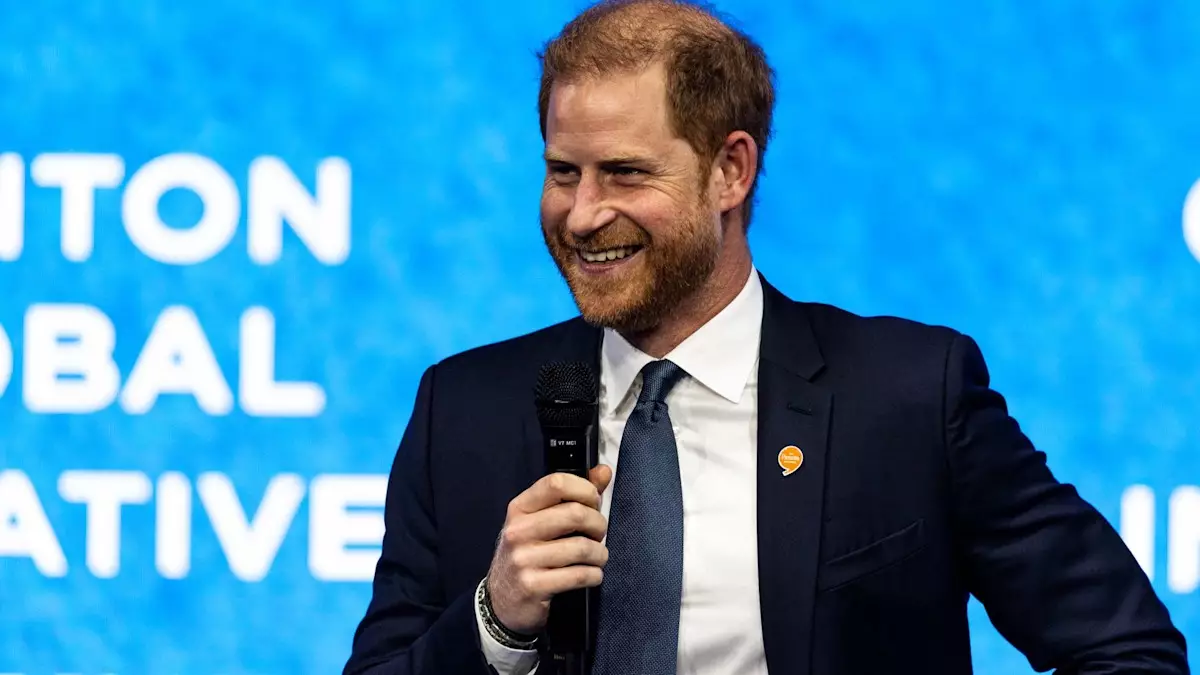During a recent engagement at the Clinton Global Initiative in New York, Prince Harry, the Duke of Sussex, provided a poignant look into the intersection of family, technology, and societal health. Speaking passionately about the urgent need to address the perils of the online environment, he revealed a personal touch with the admission that his phone lock screen features a picture of his two young children, Archie and Lilibet. This gesture symbolizes not only his role as a father but also emphasizes the focus of his discourse: the well-being of children in an increasingly digital world.
Harry’s revelation was not merely a sentimental reference; it set the stage for a discussion that underscored the gravity of social media’s impact on the youth of today, revealing a deep-rooted concern that transcends personal anecdotes. He remarked on the beautiful faces of children—both familiar and not—that have been displayed on screens and have become victims of an online environment riddled with challenges.
In his speech, Prince Harry outlined the immediate threats posed by social media to children’s mental health. His assertion that the digital landscape can no longer be viewed purely through the lens of profitability and innovation resonates strongly in today’s context. The modern world is a complex web of interactions, and Harry’s emphasis on the negative experiences faced by young people highlights a critical urgency.
Statistics confirming increased levels of anxiety, depression, and social isolation among youths drawn into the depths of our digital age were prominent in his argument. He powerfully articulated that today’s children are navigating a hostile environment that isn’t just challenging but potentially life-altering. Harry’s comments resonate with a growing body of research observing these troubling trends in minors that cannot simply be dismissed as fleeting childhood woes.
Harry’s message extends beyond mere recognition; he called for a collective responsibility to combat these urgent issues. He defended the need for initiatives like the Archewell Foundation’s Parents Network, which seeks to aid families affected by online harm and provide a supportive community for navigating the increasingly difficult waters of parenting in a digital age. His vision calls for both awareness and tangible actions to protect children, reinforcing that the response to this crisis requires collaboration among parents, tech companies, and policymakers alike.
In a light-hearted moment, the Duke harkened back to his own rebellious youth, a reminder that while mischief is a part of adolescent life, today’s children face predatory designs fostered by social media platforms that exacerbate their struggles. By openly discussing his past and infusing humor into a serious subject, he managed to connect with the audience on a personal level while simultaneously underscoring the sinister undertones of online interactions.
Prince Harry’s public appearances are deeply influenced by his late mother, Princess Diana, who had her own historically significant engagements with humanitarian causes, particularly in awareness about landmines. His mention of The Halo Trust, the organization she championed, reinforces a legacy of advocacy and care for those vulnerable: a thread that carries through Harry’s endeavors today.
As the Duke reflected on changes in his life since his 2019 visit, he acknowledged his own growth and evolution as not only a humanitarian leader but also as a dedicated father. Navigating these contrasting roles provides Harry with unique insights that drive his commitment to safeguarding future generations from the unseen perils of digital engagement.
Prince Harry’s participation in the Clinton Global Initiative isn’t merely an obligation; it is part of a larger narrative that involves taking a stand for critical issues that affect our society. His blend of personal reflection and robust advocacy reveals his determination to shape discourse on child welfare amid a transforming digital landscape. The message is clear: as guardians of our future, we must take conscious steps toward creating a safer, healthier online realm for the generations that will follow. Embracing change, armed with awareness and integrity, is imperative in confronting the challenges posed by today’s digital age.

Leave a Reply